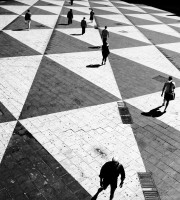“Nationalism is the pathology of modern developmental history, as inescapable as ‘neurosis’ in the individual, with much the same essential ambiguity attaching to it, a similar built-in capacity for descent into dementia, rooted in the dilemmas of helplessness thrust upon most of the world (the equivalent of infantilism for societies) and largely incurable.” Tom Nairn
“I propose the following definition of the nation: it is an imagined political community – and imagined as both inherently limited and sovereign.
It is imagined because the members of even the smallest nation will never know most of their fellow-members, meet them, or even hear of them, yet in the minds of each lives the image of their communion. […] In fact, all communities larger than primordial villages of face-to-face contact (and perhaps even these) are imagined. Communities are to be distinguished, not by their falsity/genuineness, but by the style in which they are imagined
The nation is imagined as limited because even the largest of them, encompassing perhaps a billion living human beings, has finite, if elastic, boundaries, beyond which lie other nations. No nation imagines itself coterminous with mankind. The most messianic nationalists do not dream of a day when all the members of the human race will join their nation in the way that it was possible, in certain epochs, for, say, Christians to dream of a wholly Christian planet.
It is imagined as sovereign because the concept was born in an age in which Enlightenment and Revolution were destroying the legitimacy of the divinely-ordained, hierarchical dynastic realm.
Finally, it is imagined as a community, because, regardless of the actual inequality and exploitation that may prevail in each, the nation is always conceived as a deep, horizontal comradeship. Ultimately it is this fraternity that makes it possible, over the past two centuries, for so many millions of people, not so much to kill, as willingly to die for such limited imaginings.
These deaths bring us abruptly face to face with the central problem posed by nationalism: what makes the shrunken imaginings of recent history (scarcely more than two centuries) generate such colossal sacrifices?”
Benedict Anderson, 1982. Imagined Communities. Reflections on the Origin and Spread of Nationalism. Introduction.
